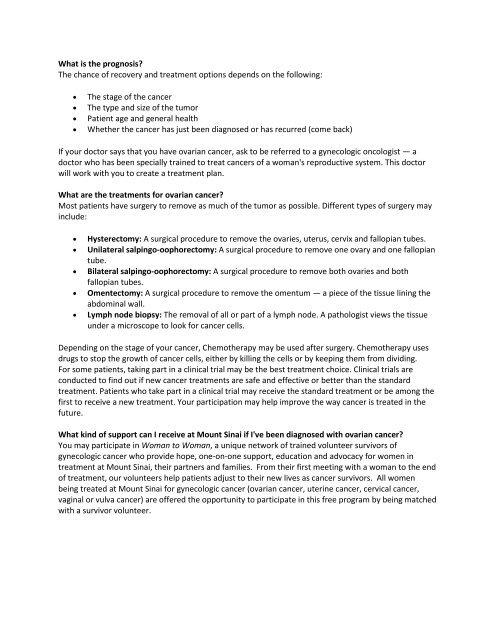Ovarian Cancer FAQs - Mount Sinai Hospital
Ovarian Cancer FAQs - Mount Sinai Hospital
Ovarian Cancer FAQs - Mount Sinai Hospital
Create successful ePaper yourself
Turn your PDF publications into a flip-book with our unique Google optimized e-Paper software.
What is the prognosis?The chance of recovery and treatment options depends on the following:• The stage of the cancer• The type and size of the tumor• Patient age and general health• Whether the cancer has just been diagnosed or has recurred (come back)If your doctor says that you have ovarian cancer, ask to be referred to a gynecologic oncologist — adoctor who has been specially trained to treat cancers of a woman's reproductive system. This doctorwill work with you to create a treatment plan.What are the treatments for ovarian cancer?Most patients have surgery to remove as much of the tumor as possible. Different types of surgery mayinclude:• Hysterectomy: A surgical procedure to remove the ovaries, uterus, cervix and fallopian tubes.• Unilateral salpingo-oophorectomy: A surgical procedure to remove one ovary and one fallopiantube.• Bilateral salpingo-oophorectomy: A surgical procedure to remove both ovaries and bothfallopian tubes.• Omentectomy: A surgical procedure to remove the omentum — a piece of the tissue lining theabdominal wall.• Lymph node biopsy: The removal of all or part of a lymph node. A pathologist views the tissueunder a microscope to look for cancer cells.Depending on the stage of your cancer, Chemotherapy may be used after surgery. Chemotherapy usesdrugs to stop the growth of cancer cells, either by killing the cells or by keeping them from dividing.For some patients, taking part in a clinical trial may be the best treatment choice. Clinical trials areconducted to find out if new cancer treatments are safe and effective or better than the standardtreatment. Patients who take part in a clinical trial may receive the standard treatment or be among thefirst to receive a new treatment. Your participation may help improve the way cancer is treated in thefuture.What kind of support can I receive at <strong>Mount</strong> <strong>Sinai</strong> if I've been diagnosed with ovarian cancer?You may participate in Woman to Woman, a unique network of trained volunteer survivors ofgynecologic cancer who provide hope, one-on-one support, education and advocacy for women intreatment at <strong>Mount</strong> <strong>Sinai</strong>, their partners and families. From their first meeting with a woman to the endof treatment, our volunteers help patients adjust to their new lives as cancer survivors. All womenbeing treated at <strong>Mount</strong> <strong>Sinai</strong> for gynecologic cancer (ovarian cancer, uterine cancer, cervical cancer,vaginal or vulva cancer) are offered the opportunity to participate in this free program by being matchedwith a survivor volunteer.



![December 2, 2012 [PDF] - Mount Sinai Hospital](https://img.yumpu.com/51092274/1/190x245/december-2-2012-pdf-mount-sinai-hospital.jpg?quality=85)
![January 21, 2013 [PDF] - Mount Sinai Hospital](https://img.yumpu.com/50916550/1/190x245/january-21-2013-pdf-mount-sinai-hospital.jpg?quality=85)

![February 3, 2013 [PDF] - Mount Sinai Hospital](https://img.yumpu.com/50584982/1/190x245/february-3-2013-pdf-mount-sinai-hospital.jpg?quality=85)
![March 18, 2012 [PDF] - Mount Sinai Hospital](https://img.yumpu.com/50462098/1/190x245/march-18-2012-pdf-mount-sinai-hospital.jpg?quality=85)



![Partners Program Guide [PDF] - Mount Sinai Hospital](https://img.yumpu.com/49411954/1/190x245/partners-program-guide-pdf-mount-sinai-hospital.jpg?quality=85)
![March 19 - April 1, 2012 [PDF] - Mount Sinai Hospital](https://img.yumpu.com/48990923/1/190x245/march-19-april-1-2012-pdf-mount-sinai-hospital.jpg?quality=85)
![PGY-1 Residency Application [PDF] - Mount Sinai Hospital](https://img.yumpu.com/48577701/1/190x245/pgy-1-residency-application-pdf-mount-sinai-hospital.jpg?quality=85)


